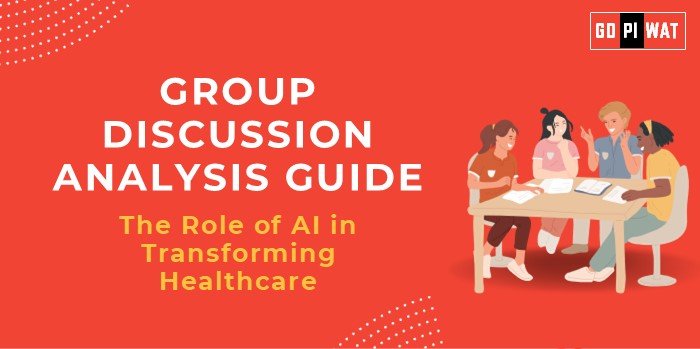📋 GD Analysis Guide: The Role of AI in Transforming Healthcare
🌐 Introduction to the Topic
Opening Context: “Artificial Intelligence (AI) is revolutionizing healthcare globally by driving innovations in diagnosis, treatment planning, and operational efficiencies. As AI adoption surges, its potential to reduce costs and improve outcomes underscores its relevance to B-school discussions.”
Topic Background: AI in healthcare gained prominence with advancements in machine learning, robotics, and big data analytics. Its applications, from predictive diagnostics to robotic surgeries, highlight its transformative potential. Recent developments include AI-driven drug discovery and the use of chatbots in patient management.
📊 Quick Facts and Key Statistics
- Market Growth: The global AI in healthcare market was valued at approximately USD 19.27 billion in 2023 and is expected to grow at a CAGR of 38.5% from 2024 to 2030.
- Diagnostic Accuracy: AI tools have improved diagnostic accuracy by up to 17% compared to human doctors, as demonstrated in studies like the UCLA research on prostate cancer detection.
- Operational Efficiency: AI applications have reduced hospital stay lengths by 6.5% and readmission rates by 2.1%, leading to significant cost savings.
- Global Adoption: 79% of healthcare organizations are currently utilizing AI technology, realizing a return on investment within 14 months.
🤝 Stakeholders and Their Roles
- Governments: Regulate AI applications, fund research, and ensure ethical standards in public health systems.
- Private Sector: Develop and deploy AI technologies across healthcare facilities, driving innovation.
- Healthcare Providers: Integrate AI tools to enhance patient care and operational efficiency.
- Patients: Benefit from improved diagnostics, personalized treatments, and efficient healthcare services.
- Academic Institutions: Conduct research and collaborate with healthcare entities to advance AI applications.
🏆 Achievements and Challenges
- Achievements:
- Enhanced Diagnostics: AI-powered tools, such as Unfold AI, have achieved diagnostic accuracies of 84%, surpassing traditional methods.
- Operational Improvements: AI implementations have led to reductions in hospital stay lengths and readmission rates, resulting in cost savings.
- Global Integration: Countries like China have unveiled AI hospitals capable of treating thousands of patients daily, showcasing large-scale AI integration.
- Challenges:
- Data Privacy: Ensuring the security of patient data amidst increasing cyber threats remains a significant concern.
- Bias in AI Algorithms: AI systems can perpetuate existing biases present in training data, leading to disparities in care.
- Implementation Costs: High costs associated with AI technologies can limit accessibility, especially in underfunded healthcare systems.
🌍 Global Comparisons
- United States: Leading in AI-driven clinical trials and drug discovery, with significant investments in healthcare AI.
- United Kingdom: The National Health Service (NHS) has integrated AI diagnostics into operations, improving patient outcomes.
📖 Case Studies
- Australia: The Adelaide Score, an AI method, has been implemented to predict patient discharge times, reducing hospital stay lengths and readmission rates.
- China: The introduction of AI hospitals capable of treating up to 3,000 patients daily demonstrates large-scale AI integration in healthcare.
🛠️ Structured Arguments for Discussion
- Supporting Stance: “AI enhances healthcare outcomes and reduces operational costs, as evidenced by improved diagnostic accuracies and efficient patient management systems.”
- Opposing Stance: “The integration of AI in healthcare raises ethical concerns, including data privacy issues and potential biases in AI algorithms.”
- Balanced Perspective: “While AI offers significant advancements in healthcare, addressing challenges such as data security and equitable access is essential for its successful implementation.”
📈 Strategic Analysis: SWOT Framework
- Strengths: Enhanced diagnostic accuracy, operational efficiency, personalized patient care.
- Weaknesses: High implementation costs, potential biases in AI systems, data privacy concerns.
- Opportunities: Expansion of telemedicine, integration with Internet of Things (IoT) devices, advancements in personalized medicine.
- Threats: Regulatory challenges, cybersecurity risks, ethical dilemmas regarding AI decision-making.
🎓 Connecting with B-School Applications
- Real-World Applications: AI’s role in healthcare intersects with B-school projects in operations management, healthcare innovation, and ethical business practices.
- Sample Interview Questions:
- “How can AI address healthcare disparities in developing countries?”
- “What are the ethical considerations of implementing AI in patient care?”
- Insights for Students: Understanding AI’s impact on healthcare can inform entrepreneurial ventures, consulting roles, and research in health-tech sectors.


